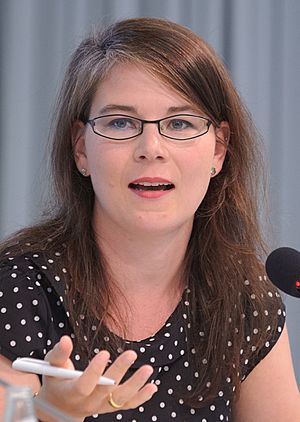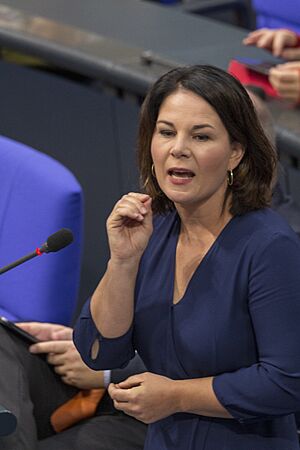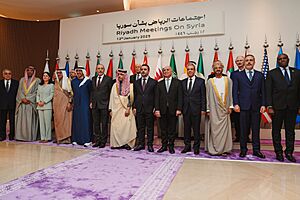Annalena Baerbock facts for kids
Quick facts for kids
Annalena Baerbock
|
|
|---|---|
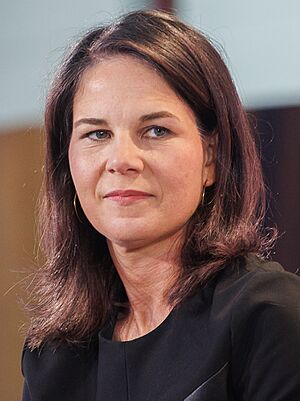
Baerbock in 2024
|
|
| President-Elect of the United Nations General Assembly | |
|
Designate
|
|
| Assuming office 10 September 2025 |
|
| Succeeding | Philémon Yang |
| Minister for Foreign Affairs | |
| In office 8 December 2021 – 6 May 2025 |
|
| Chancellor | Olaf Scholz |
| Preceded by | Heiko Maas |
| Succeeded by | Johann Wadephul |
| Leader of Alliance 90/The Greens | |
| In office 27 January 2018 – 29 January 2022 Serving with Robert Habeck
|
|
| Deputy |
|
| Preceded by | Simone Peter |
| Succeeded by | Ricarda Lang |
| Leader of Alliance 90/The Greens in Brandenburg |
|
| In office 14 November 2009 – 16 November 2013 Serving with Benjamin Raschke
|
|
| Preceded by | Ska Keller |
| Succeeded by | Petra Budke |
| Member of the Bundestag for Brandenburg |
|
| In office 22 October 2013 – 30 June 2025 |
|
| Preceded by | Cornelia Behm |
| Succeeded by | Andrea Lübcke |
| Constituency | Alliance 90/The Greens List |
| Personal details | |
| Born |
Annalena Charlotte Alma Baerbock
15 December 1980 Hanover, West Germany |
| Political party | The Greens (since 2005) |
| Spouse |
Daniel Holefleisch
(m. 2007; separated 2024) |
| Children | 2 |
| Education | University of Hamburg |
| Alma mater | London School of Economics (LLM) |
| Occupation |
|
| Signature | |
Annalena Charlotte Alma Baerbock (born 15 December 1980) is a German politician and diplomat. She is a member of the Alliance 90/The Greens party. From 2021 to 2025, she was Germany's foreign minister. In June 2025, she was chosen to be the President of the United Nations General Assembly. Her term will start in September 2025.
From 2018 to January 2022, Baerbock was a co-leader of the Green Party, working with Robert Habeck. She was also the party's candidate for chancellor in the 2021 federal election. After the election, the Greens joined a government led by Olaf Scholz. Baerbock became Germany's first female foreign minister on 8 December 2021.
Born in Hanover, West Germany, in 1980, Baerbock studied at the University of Hamburg and the London School of Economics and Political Science. She was first elected to the Bundestag (German parliament) in 2013.
Contents
Early Life and Education
Annalena Baerbock grew up in Schulenburg, near Hanover. Her father was a mechanical engineer, and her mother was a social worker. As a child, she often joined her parents at protests against war and nuclear power. These protests were supported by the Green Party.
She attended the Humboldt School in Hanover. At 16, she spent a year studying in the United States. She went to Lake Highland Preparatory School in Orlando, Florida.
As a teenager, Baerbock was a skilled trampoline gymnast. She competed in German championships and won bronze medals three times.
University Studies
From 2000 to 2004, Baerbock studied political science at the University of Hamburg. She also worked as a journalist for a local newspaper, the Hannoversche Allgemeine Zeitung. She gained experience through internships at different media and international organizations.
In 2005, Baerbock earned a master's degree in public international law from the London School of Economics (LSE). She also started a research project on natural disasters, but she did not complete it.
Beginning Her Political Journey
After her studies, Baerbock worked for a Member of the European Parliament from 2005 to 2008. Later, she advised the Green Party's group in the Bundestag on foreign and security policies.
Joining the Green Party
Baerbock became a member of Alliance 90/The Greens in 2005. In 2008, she was elected to the leadership board of her party's group in Brandenburg. The next year, she became a co-chair of the board, a role she held until 2013.
She also served as the national spokesperson for the Green Party's European affairs group. From 2009 to 2012, she was part of the leadership of the European Green Party.
Member of the German Parliament
In 2013, Annalena Baerbock became a member of the Bundestag, Germany's parliament. She was the top candidate on her party's list for the state of Brandenburg.
During her first term, she was a member of important committees. These included the Committee on Economic Affairs and Energy and the Committee on European Affairs. She also spoke for her party on climate policy. In this role, she attended several UN Climate Change Conferences.
Baerbock was re-elected to the Bundestag in 2017, 2021, and 2025. She resigned from her seat on 30 June 2025, to take on her new role at the United Nations.
Leading the Green Party
On 27 January 2018, Baerbock was elected as one of two co-leaders of the Green Party at the national level. She served alongside Robert Habeck. She won 64% of the votes. In 2019, she was re-elected with an even higher percentage of votes.
In 2021, the Green Party officially nominated Baerbock as their candidate for chancellor. This was the first time the party had nominated a single candidate for this role. She was also the second woman, after Angela Merkel, to seek Germany's highest government office.
In the 2021 federal election, the Greens achieved their best result ever. They won 14.8% of the national vote and 118 seats in the Bundestag.
Germany's Foreign Minister
After the 2021 election, the Green Party formed a government with the Social Democrats and the Free Democratic Party. This was called a "traffic light coalition." Annalena Baerbock became the Foreign Minister on 8 December 2021. She was the first woman to hold this important position.
Key Diplomatic Engagements
As Foreign Minister, Baerbock traveled to many countries. In December 2021, she visited Warsaw to discuss issues with the Polish Foreign Minister. She supported Poland's efforts to manage the flow of migrants from Belarus.
She also warned about the serious humanitarian situation in Afghanistan. She said that many people needed help and that hundreds of thousands of children were at risk. She promised to help evacuate vulnerable Afghans.
In 2022, Germany held the presidency of the Group of Seven (G7). Baerbock led the meetings of the G7 Foreign Ministers.
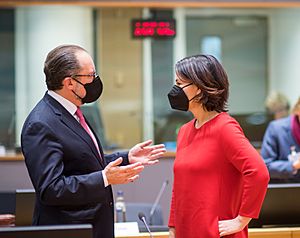
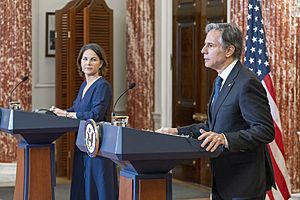
In January 2022, Baerbock initially did not support sending German weapons to Ukraine. However, after the Russian invasion in February 2022, she changed her stance. She later argued against blocking Russian banks from the SWIFT system. After reports of war crimes in Ukraine, she expelled 40 Russian diplomats from Berlin.
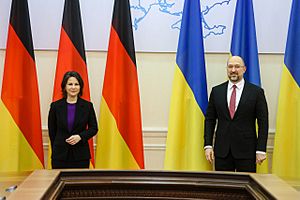
In July 2022, she stated that Greek islands in the Aegean Sea are Greek territory. She also warned against Turkey's plans for an offensive in northern Syria.
In January 2023, Baerbock visited Ethiopia with her French counterpart. Their goal was to support the peace agreement ending the Tigray War. She also visited Kharkiv in Ukraine for the third time.
In March 2023, she visited Baghdad and urged Iran to stop missile attacks on Iraqi territory. In May 2023, she called on China to take a clear position on the Russo-Ukrainian War. She stated that "neutrality means taking the side of the aggressor."
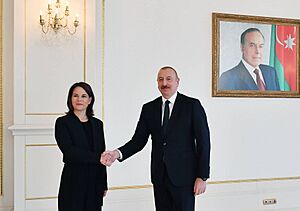
In May 2023, she visited Saudi Arabia. She praised Saudi efforts to find solutions to conflicts in Yemen and Sudan. In September 2023, Baerbock opposed the decision by the U.S. to supply cluster munitions to Ukraine.
She also criticized Azerbaijan in September 2023 for military action in Nagorno-Karabakh. She called for a halt to the offensive and a return to talks. In February 2024, she hosted peace talks between Azerbaijan and Armenia in Berlin.
During the conflict in Gaza, Baerbock expressed support for Israel. She stated that "For Germany, Israel's security is non-negotiable." She also called for "humanitarian pauses" to deliver aid to civilians in Gaza. She and UK Foreign Secretary David Cameron wrote an article calling for actions to lead to a sustainable ceasefire.
In January 2025, Baerbock visited Damascus with her French counterpart. They met with the leader of Syria. This was the first visit by EU ministers since the change in leadership in Syria.
President-Elect of the UN General Assembly
In June 2025, Annalena Baerbock was elected to be the President of the United Nations General Assembly. She will lead its 80th session, starting in September 2025. She received 167 out of 193 votes.
Political Views
Foreign Policy Stance
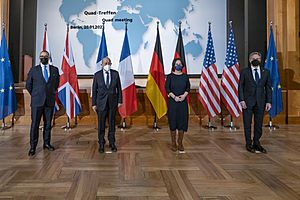
Baerbock supports a strong common foreign policy for the European Union. She believes Europe should be more active globally, especially concerning Russia and China. She has called for a European army and supports cooperation with the United States and NATO. She believes in defending international rules and laws.
She has also expressed concern about the number of UN resolutions criticizing Israel.
Energy and Climate Policy
Baerbock supports a "Green Deal" for Europe and across the Atlantic. She wants countries worldwide to limit global temperature increases to 1.5 °C, as agreed in the Paris Agreement. She is against the Nord Stream 2 gas pipeline project.
She has called for Germany to stop using coal by 2030. She also supports limits on car speeds and wants only emission-free cars to be registered by 2030. Baerbock believes that climate policy can also help the economy. She supports making steel production climate-neutral and using carbon taxes on goods. She also wants to strengthen the rail network to reduce domestic flights.
Baerbock is against nuclear power. She opposed a proposal to label nuclear power as a green energy source.
Immigration Views
During the European migrant crisis in 2015, Baerbock called for the European Commission to take more responsibility for managing refugees. She also supported EU-managed facilities for asylum seekers.
In September 2023, Baerbock criticized a migration deal between the European Union and Tunisia. She supports financial help for organizations that rescue migrants in the Mediterranean Sea.
Other Activities
Annalena Baerbock is involved with several organizations. She is an ex-officio member of the Board of Supervisory Directors for KfW, a German state-owned development bank. She is also on the Board of Trustees for the Alexander von Humboldt Foundation.
Since 2020, she has been part of the World Economic Forum's Young Global Leaders program. This program coaches political leaders from around the world.
Personal Life
Annalena Baerbock has two daughters, born in 2011 and 2015. She was married to Daniel Holefleisch, a political consultant. They separated in November 2024.
She is a member of the Protestant church. She has said that the idea of community is very important to her.
See also
 In Spanish: Annalena Baerbock para niños
In Spanish: Annalena Baerbock para niños


